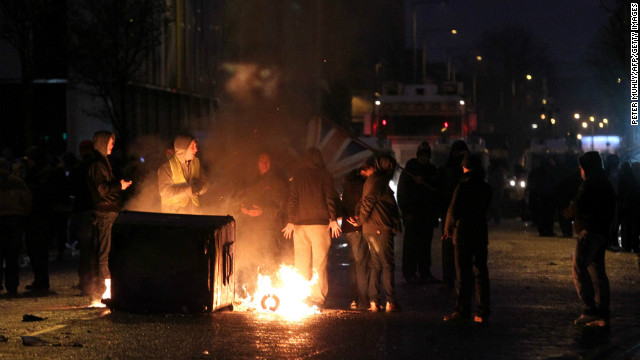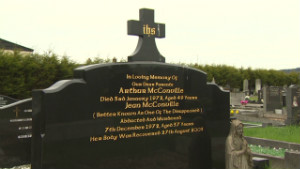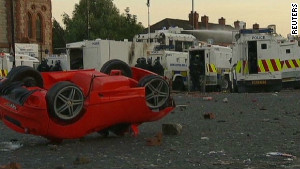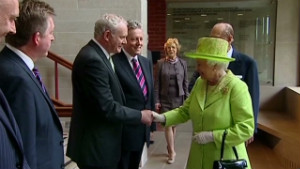
- NEW: Authorities accuse a loyalist extremist group of ''orchestrating violence''
- The Belfast City Council meets for the first time since its controversial ruling
- In December, the council voted to fly the Union Jack only on certain days
- The flag is a flashpoint between those who want to remain part of the UK and those who don't
Belfast, Northern Ireland (CNN) -- Authorities accused pro-British extremists of exploiting protests in Northern Ireland over the Belfast City Council decision to stop a century-old tradition of flying the Union Jack year-around.
The announcement Monday came the same day as authorities braced for another night of possibly violent protests as the City Council meets for the first time since it voted to fly the British flag only on certain days. Protesters have been calling for the council to reverse its ruling over the flag.
Authorities say at least 52 officers have been wounded in protests that have seen demonstrators throw petrol bombs and bricks at authorities, who have responded with water cannons and plastic bullets.
The chief constable for the Police Service of Northern Island put the blame for the violence on members of the loyalist Ulster Volunteer Force, who were "orchestrating violence for their own selfish motives."
The British flag, the Union Jack, has long been a flashpoint between British loyalists -- primarily Protestants -- who want to remain part of the United Kingdom and Irish nationalists calling for Northern Ireland to join Ireland.
Northern Ireland's political leaders have called for an end to the pro-British protests, and politicians, clergy and community met Sunday to discuss possible ways to bring about an end to the unrest.

 Secrets of the Belfast Project
Secrets of the Belfast Project 
 Violent clashes flare in Belfast
Violent clashes flare in Belfast 
 Historic handshake: Queen, ex-IRA leader
Historic handshake: Queen, ex-IRA leader But there was little indication Monday that the demonstrations were dying down, with organizers taking to social media with calls for protesters to converge on Belfast's City Hall before the council meeting and word that more protests were being planned daily for the rest of the week.
"Everyone involved needs to step back. The lack of control is very worrying," Chief Constable Matt Baggott told CNN.
"The only answer is a political solution."
A large number of police officers have been pulled away from their normal duties to deal with the demonstrations, Baggott said.
If this carries on, "it will eat into our ability to deal with drugs, into our ability to deal with alcohol issues, and deal with what is a very severe dissident threat."
On Sunday, the Police Service of Northern Ireland said officers were prepared for more violence.
Among the more than 70 arrested since the protests began was a 38-year-old man who was arrested Saturday on suspicion of attempted murder and being in possession of a gun. Police said at the time of the man's arrest, there were reports of shots being fired at police.
The vote on the flag followed a summer of heightened tensions between Northern Ireland's Catholic and Protestant communities. Riots in September left dozens of police officers injured.
The majority of the island gained independence in 1921, following two years of conflict. But six of the nine counties of the province of Ulster chose to stay in the United Kingdom, eventually becoming the country of Northern Ireland.
In the late 1960s, the conflict between mainly Protestant loyalists, who want Northern Ireland to remain part of the United Kingdom, and largely Roman Catholic nationalists, who want it to be reunited with the rest of Ireland, exploded into a political and sectarian war, known as "the Troubles."
The three decades of ensuing violence between loyalists and the IRA claimed more than 3,000 lives, most of them north of the border. While the Good Friday Agreement of 1998, also known as the Belfast Agreement, effectively ended the conflict, distrust remains between Catholics and Protestants.
Under the terms of the accord, groups on both sides dumped their weapons, and members of Sinn Fein, the political affiliate of the IRA, now work with pro-British politicians in Northern Ireland's power-sharing government.
CNN's Chelsea J. Carter contributed to this report.
tax relief hurricane birmingham air ambulance international air ambulance
No comments:
Post a Comment